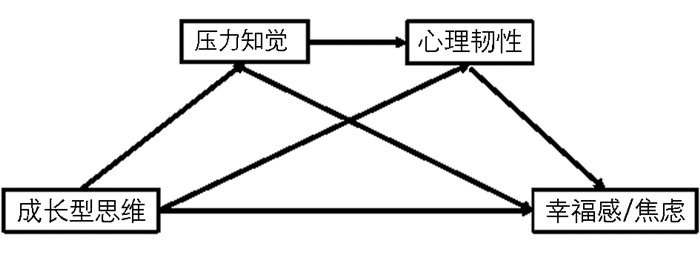全文HTML
-
近年来,随着积极心理学的发展,探讨如何从积极教育角度提升个体幸福感已成为越来越多研究者关注的主题。大学生作为社会发展的优秀人才资源,在各种诸如学业、经济、人际和择业等压力源中保持情绪健康和主观幸福极为重要。根据认知—易感—应激模型[1],个体对种种压力源的消极认知是情绪问题的易感因素,而这一内在认知可能始于其思维模式,即对人的能力可塑性的朴素解释[2]。研究表明,作为积极教育的核心要素,思维模式决定着个体的学业表现和主观幸福感[3-4]。基于此,本研究对处于压力情境中的大学生思维模式与其情绪表现的关系进行探究,为从积极教育角度提升大学生情绪健康提供理论依据和实践参考。
-
思维模式指人们对智力、能力是否可变的信念,由C.·Dweck于20世纪80年代提出。该理论认为个体拥有两种完全不同的思维模式:固定型思维模式(能力与生俱来,固定不变)和成长型思维模式(能力可塑,后天努力可以改善)。根据动机的社会认知理论,固定型思维个体以追求外部优异成绩和表现为目标,在遇到压力或挫折时往往会逃避和无助,而成长型思维个体以掌握知识和技能为目标,在遇到压力或挫折时会付出更多的努力和坚持性[2]。由于两种思维模式个体的目标设定、归因方式及努力程度等差异,引发了个体面临压力情境时不同的情绪、心理和行为倾向[5-6]。近年来,思维模式对情绪健康的影响受到越来越多研究者的关注,其中更多倾向于探究青少年的思维模式与其情绪表现的关系[4-5, 7],发现成长型思维的青少年在压力情境下表现出更高的幸福感、满意度等积极情绪,而固定型思维的青少年往往容易产生更多羞耻、焦虑和抑郁等消极情绪。纵向的干预研究表明对青少年进行成长型思维的培养可以有效缓解其焦虑和抑郁情绪[8-9]。考虑到思维模式对个体情绪的影响受到年龄因素的调节[10],而大学生的思维模式、情绪对其心理健康和学业发展具有重要影响[11],有必要进一步探究大学生群体的思维模式如何影响其情绪表现。据此,本研究提出假设1:大学生思维模式显著影响情绪表现。
-
压力知觉是指个体对环境中的威胁性刺激经过认知评价后表现出的一系列身心紧张感和不适感[12]。基于生物心理社会的挑战和威胁模型,个体思维模式影响其对客观压力源的评估。成长型思维个体更倾向于对压力源进行挑战性评估,即认为自身有充分资源应对并满足压力情境下的需求,易形成积极的期望和可控信念; 而固定型思维个体更倾向于将压力源视为威胁,易形成消极的期待和失控信念。两种思维模式个体对相同压力源的评估差异造成了不同程度的压力知觉[13]。Yeager等研究发现无论是对日常生活中的压力源还是实验室诱发的社会性压力源,个体思维模式越倾向于成长型,则越倾向于对压力源进行挑战性评估,继而引发更低程度的压力知觉。一些干预研究也发现通过塑造成长型思维可以降低个体对学业困境的压力知觉[14-15]。此外,研究发现个体压力知觉对不同情绪类型的影响存在差异,表现为个体的压力知觉正向预测焦虑、抑郁等负性情绪,而负向预测幸福感、生活满意度等积极情绪[16-17]。考虑到思维模式、压力知觉和情绪表现三者的相互作用关系,有必要进一步探究个体思维模式是否通过压力知觉作用于情绪表现。鉴于此,本研究提出假设2:压力知觉在大学生思维模式与情绪之间起中介作用。
-
心理韧性指个体从不良情境中尽快恢复,灵活适应多变环境的能力,它能够帮助个体在压力事件、生活逆境或创伤经历中维持身心健康,是一种重要的心理资源[18]。根据成就的动机模型,不同思维模式会促进或削弱个体的心理韧性水平[8]。在面临压力或挫折情境时,成长型思维个体将其看成是自我成长的机会,积极调动心理资源来努力付出,表现为较高的心理韧性。反之,固定型思维个体将其看成是自身能力不足的表现,消极面对且反应无助,表现出较低的心理韧性。实证研究表明,相比于固定型思维个体,成长型思维个体在面对困难时心理韧性更强[3-4]。一项针对有留守经历大学生为调查对象的研究显示持有成长型思维可以降低留守经历这一逆境对大学生心理韧性的损害效应[19]。另一方面,研究者采用诸如自我报告、观察和纵向追踪等方法证实心理韧性影响个体处于逆境时的情绪表现[20]。高心理韧性与大学生幸福感、生活满意度等积极情绪呈显著正相关,而与焦虑、抑郁等负性情绪呈显著负相关[21-22]。据此,本研究提出假设3:心理韧性在大学生思维模式与情绪之间起中介作用。
-
对于本研究的两个中介变量,研究发现压力知觉能够负向预测心理韧性[23]。根据压力的认知理论模型,个体在压力情境下会产生失控和紧张感,导致无法充分调动身心资源来应对压力,表现出较低的心理韧性[24],而这种高水平的压力知觉所产生的较低的心理韧性最终影响个体的抑郁[1]和心理幸福感[17]等情绪表现。同时,作为心理韧性的保护性因子,已有研究发现个体的思维模式能够通过心理韧性影响幸福感[4]。因此本研究推测,面对压力情境,个体思维模式越倾向于成长型,越倾向于压力源进行挑战性评估,继而引发更低程度的压力知觉。而较低的压力知觉能激发个体较高的心理韧性去调动身心资源应对压力,最终达到对压力情境的良好适应和积极的情绪状态。鉴于此,本研究提出假设4:压力知觉、心理韧性在个体思维模式和情绪表现之间起链式中介作用。
综上,在已有研究的基础上,以大学生为研究对象,构建一个链式中介模型(见图 1),探讨大学生思维模式对情绪的作用机制,鉴于情绪有积极和消极之分且每种情绪类型成分不一[25],而个体思维模式对不同情绪类型影响可能存在差异[11],本研究分别选取积极情绪中的幸福感[26]和消极情绪中的焦虑[27]作为测量指标来考察思维模式对情绪的影响,并进一步考察压力知觉和心理韧性的链式中介作用。
一. 思维模式对情绪的影响
二. 压力知觉的中介作用
三. 心理韧性的中介作用
四. 压力知觉和心理韧性的链式中介作用
-
采用方便抽样法,通过网络向高校大学生发放并回收问卷300份,剔除无效和缺失问卷,最终得到有效问卷273份,有效率为91%。其中男生74名,女生199名。被试平均年龄为21.33岁(SD=0.97)。
-
采用Dweck编制的成长型思维量表(growth mindset scale,GMS),共20题,如“你总是能够在很大程度上改变你有多智慧”[3]。量表采用Likert4点计法(0=非常不同意,3=非常同意),其中第1、4、7、8、11、12、14、16、17和20题为反向计分。被试在该量表上的得分越高说明成长心态越强烈。本研究中该量表的Cronbach'sα系数为0.86。
-
采用杨廷忠等编制的压力知觉量表(perceived stress scale,PSS),共14题,如“感觉到紧张不安和压力”[28]。量表采用Likert6点计法(0=从不,4=总是),其中第4、5、6、7、9、10和13题为反向计分。被试在该量表上的得分越高说明压力知觉水平越高。本研究中该量表的Cronbach'sα系数为0.80。
-
采用于肖楠和张建新翻译修订的心理韧性量表(Connor-Davidson resilience scale,CD-RISC)中文版,共25题,如“我通常都能从容地应对问题”[29]。量表采用Likert7点计分法(1=非常不同意,7=非常同意)。被试在该量表上的得分越高说明心理韧性水平越高。本研究中该量表的Cronbach'sα系数为0.92。
-
采用Hills和Argyle编制的牛津幸福感量表(Oxford happiness questionnaire,OHQ),共29题,如“我对自己的生活非常满意”[26]。量表采用Likert6点计法(1=非常不同意,6=非常同意),其中第1、5、6、10、13、14、19、23、24、27、28和29题为反向计分。被试在该量表上的得分越高说明幸福感水平越高。本研究中该量表的Cronbach'sα系数为0.73。
-
采用我国学者李文利和钱铭怡翻译修订的状态-特质焦虑问卷(state-trait anxiety inventory,STAI)中的特质焦虑子问卷,共20题,如“我感到神经过敏和不安”[27]。量表采用Likert4点计法(1=几乎没有,4=几乎总是如此),其中第1、3、4、6、7、10、13、14、16和19题为反向计分。被试在该量表上的得分越高说明焦虑水平越高。本研究中该量表的Cronbach'sα系数为0.91。
-
采用SPSS20.0统计软件进行共同方法偏差检验、描述及相关分析; 通过PROCESS宏程序中的模型6进行链式中介模型检验,回归系数的显著性检验采用Bootstrap方法(重复抽样5000次); 使用Mplus对链式中介模型拟合参数进行估计。
-
对可能存在的共同方法偏差采用了程序控制和Harman单因子检验。程序控制包括问卷设置反向题,强调匿名性和保密性。Harman单因子检验发现108个项目共有27个因子的特征值大于1,且第一个因子解释的变异量为23.05%,小于40%临界判定标准。因此本研究的共同方法偏差问题不严重。
一. 研究对象
二. 研究工具
1. 成长型思维量表
2. 压力知觉量表
3. 心理韧性量表
4. 幸福感问卷
5. 焦虑问卷
三. 数据分析
四. 共同方法偏差检验
-
各变量的描述统计及Pearson相关分析结果如表 1。结果显示,成长型思维与压力知觉、焦虑显著负相关,成长型思维与心理韧性、幸福感显著正相关。压力知觉与心理韧性、幸福感显著负相关,压力知觉与焦虑显著正相关。心理韧性与幸福感显著正相关,心理韧性与焦虑显著负相关。幸福感和焦虑显著负相关。各变量间的显著相关为多重中介效应检验提供了依据。
-
运用Mplus 7.4检验中介模型[30]。结果显示,成长型思维与幸福感的中介模型拟合指数良好:χ2(6)=65.20,TLI=0.99,CFI=1.00,RMSEA=0.001,SRMR=0.001。成长型思维与焦虑的中介模型拟合指数良好:χ2(6)=43.80,TLI=0.99,CFI=0.99,RMSEA=0.001,SRMR=0.01。
参考多步中介变量的检验方法,采用Bootstrap方法对数据重复抽样5 000次进行中介效应检验[31]。压力知觉和心理韧性在成长型思维和幸福感或焦虑关系中的多重中介作用见图 2。
中介效应检验表明,压力知觉和心理韧性在成长型思维和幸福感间起中介作用,中介效应由三条路径产生的间接效应组成:成长型思维→压力知觉→幸福感(0.08);成长型思维→心理韧性→幸福感(0.06);成长型思维→压力知觉→心理韧性→幸福感(0.08)。此外,压力知觉和心理韧性在成长型思维和焦虑间起中介作用,中介效应由三条路径产生的间接效应组成:成长型思维→压力知觉→焦虑(-0.12);成长型思维→心理韧性→焦虑(-0.02);成长型思维→压力知觉→心理韧性→焦虑(-0.03)。如表 2所示,所有间接效应的Bootstrap 95%置信区间均不包含0,表明效应达到显著水平。
一. 描述性统计及相关分析
二. 假设模型检验
-
大学生面临着来自学业、就业等各方面的压力,如何在压力情境中保持情绪健康至关重要。本研究探究大学生思维模式与积极/消极情绪的关系,并进一步考察压力知觉和心理韧性的中介作用。结果发现,思维模式能够直接或通过压力知觉-心理韧性链式间接路径预测幸福感和焦虑。
-
本研究发现大学生思维模式越趋近于成长型,所体验到的幸福感越多,而焦虑感越少,假设H1被证实,这与前期研究结果一致[4, 9]。与青少年相似,大学生也会从成长型思维中获取更多积极情绪体验[11]。根据动机的社会—认知理论[2],就处于各种压力情境中的大学生群体而言,持有成长型思维会让他们将挫折或失败看成是“学习和能力提升的机会”,因此仍能够保持与成功时一样的积极情绪,甚至会更加乐观,这可能与他们高水平的自尊以及运用自身能力去追求更有价值的东西有关[7]。而持有固定型思维会让他们将挫折或失败看成是“自身不够聪明或能力不足”,这种负面评估会极大地影响自我价值感[8],并由此导致诸如压抑、焦虑和抑郁等负性情绪的产生[32]。
-
本研究发现压力知觉在思维模式与幸福感和焦虑情绪之间起中介作用,假设H2被证实。考虑到大学生所面临的相似的客观压力源可能会在不同个体中得到不一致的体验[33],本研究引入个体对压力的感知(压力知觉)来研究情绪的内在影响机制,结果发现个体的思维模式越趋近于成长型,压力知觉越小,所体验到的幸福感越多,焦虑感越少。胡心怡和陈英和指出,个体的思维模式构成了其对压力情境的“解释系统”,影响个体对压力情境中的内外部信息的理解和判断,从而影响其后续的情绪表现[34]。个体思维越趋近于成长型,越倾向于对压力源进行挑战性评估,即将逆境看成是自身能力提升的机遇和挑战,从而对逆境感知较低的压力,并进一步体验到更多的幸福和更少的焦虑感[16-17]。
-
本研究发现心理韧性在思维模式与幸福感和焦虑情绪之间起中介作用,假设H3被证实,与其他研究结果一致[4]。成长型思维个体倾向于幸福感更高而焦虑感更低,是因为他们具备较高的心理韧性来处理日常的压力。根据动机的归因理论,越偏向于成长型思维的个体,对困难和逆境越倾向于进行可控性而非不可控性归因,相信自身努力可以战胜困难,不害怕失败,故而心理韧性越好[8]。而较高的心理韧性使个体对生活有乐观、热情和精力充沛的态度,对新的经历充满好奇和开放,往往有高度积极的情绪来帮助他们对抗消极经历的负面影响[18]。可见,成长型思维模式可以作为一种保护性因素使个体产生更高的心理韧性来对抗压力环境,并最终使个体维持或恢复积极情绪。
-
余芝云和连榕指出,不同的思维模式使个体在面对压力或逆境时表现出不同的情绪,行为和生理反应[13]。关于思维模式与情绪表现的关系,已有研究发现思维模式对情绪表现的影响比单纯的线性关系更为复杂,它可以通过归因方式、自我概念、目标定性[35-36]等因素的中介作用来形成影响情绪的复杂机制。与此类似,本研究发现压力知觉和心理韧性对思维模式影响情绪的中介作用,并进一步发现了思维模式能够通过压力知觉和心理韧性的链式中介作用预测情绪,假设H4被证实。这一链式中介作用说明,成长型思维能够降低个体对压力的感知,进而提升心理韧性,并最终影响情绪表现。根据心理韧性的相互作用模型[37],压力知觉是大学生心理韧性的危险因子[23],当存在成长型思维这一保护性因子时,便赋予了个体对压力或逆境的免疫力。具体而言,持有成长型思维能促使个体对压力源及自身资源形成积极评估以感知更低的压力,使个体表现出较高的心理韧性以调动身心资源抵抗逆境,并最终维持个体较高的幸福感及良好的身心适应状态[22]。
-
本研究揭示了思维模式对大学生情绪的内在作用机制,帮助我们更好地理解了个体因素如何直接、间接作用于大学生的积极和消极情绪,但仍存在一些不足。首先,本研究采用幸福感和焦虑作为情绪的测量指标,并未充分考虑到其他不同类型的积极/消极情绪,未来可以采用更丰富的情绪测量指标[38]对该问题进行更深入的探讨; 其次,考虑到在感知压力、心理韧性及情绪体验等方面存在性别差异[39],且性别变量约束着思维模式影响情绪的边界条件[13],未来研究可以进一步探索男女思维模式影响情绪的不同内在机制; 最后,本研究是一项横断研究,无法反映出成长型思维模式对情绪的积极作用是如何纵向发挥作用的,未来可以进行追踪研究以期更好地探讨几个变量间的因果关系。
实践层面,本研究为大学生情绪问题的预防和干预提供了新颖视角。大学生能从成长型思维中获取更多积极的情绪体验。拥有成长型思维可以帮助处于压力情境中的大学生减少感知到的压力水平,增强他们的心理韧性程度,缓解焦虑并获得幸福体验。这为从培养成长型思维角度来改善大学生情绪问题和维持情绪健康提供了启示和价值。Chiu等提出个体的思维模式并非固定不变,成长型的思维模式可以干预并培养。Dweck及其团队近年来致力于开发成长型思维模式的干预项目,融合脑科学和心理学的研究成果,从实验室如借助名人语录、阅读文本等方式(Yeager et al.,2013)或教育情境如大脑可塑性课程、心智训练策略培训等方式(Verberg et al.,2018)激发并培养个体的成长型思维,其余诸如文本故事法、SMART五原则和PERTS模式等对成长型思维的教育培育也卓有成效[40]。鉴于此,未来的教育实践可以考虑从积极心理学视角出发,以培育成长型思维模式为抓手,帮助大学生预防并改善情绪问题,从而有效提升其幸福感。




 下载:
下载:
